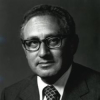Henry A. Kissinger

Henry A. Kissinger
Henry Alfred Kissingeris an American diplomat and political scientist. He served as National Security Advisor and later concurrently as United States Secretary of State in the administrations of presidents Richard Nixon and Gerald Ford. For his actions negotiating the ceasefire in Vietnam, Kissinger received the 1973 Nobel Peace Prize under controversial circumstances, with two members of the committee resigning in protest. Kissinger later sought, unsuccessfully, to return the prize. After his term, his advice has been sought by world leaders...
NationalityGerman
ProfessionStatesman
Date of Birth27 May 1923
CountryGermany
The true conservative is not at home in social struggle. He will attempt to avoid unbridgeable schism, because he knows that a stable social structure thrives not on triumphs but on reconciliations.
Revolutionaries are rarely motivated primarily by material considerations-though the illusion that they are persists in the West.
We attempted to try to solve every problem in the world, out of a sense of moral obligations, and attitudes, and our history. But no country can solve every problem without exhausting itself. Therefore, we have to establish priorities.
Now when I bore people at a party they think it's their fault.
Tutelage is a comfortable relationship for the senior partner, but it is demoralizing in the long run. It breeds illusions of omniscience on one side and attitudes of impotent irresponsibility on the other.
The public life of every political figure is a continual struggle to rescue an element of choice from the pressure of circumstance.
Competing pressures tempt one to believe that an issue deferred is a problem avoided; more often it is a crisis invited.
I have said there are three principles that should be followed. One, we should maintain the "one China" policy that every American president has articulated, including President Reagan. Secondly, we should make clear that we want a peaceful resolution. And three, Taiwan should not challenge that arrangement in a way that will provoke a conflict. Those are three perfectly clear principles. I haven't used any of the other slogans.
John Paul II was one of the greatest men of the last century. Perhaps the greatest.
Committees are consumers and sometimes sterilizers of ideas, rarely creators of them.
To revolutionaries the significant reality is the world which they are fighting to bring about, not the world they are fighting to overcome.
What China would do, I cannot predict. China has all but given up the claim to the use of force, except in the circumstance of Taiwan declaring its independence. That is a huge step forward over what the situation was many years ago.
If you mean by "military victory" an Iraqi government that can be established and whose writ runs across the whole country, that gets the civil war under control and sectarian violence under control in a time period that the political processes of the democracies will support, I don't believe that is possible.
The greatest need of the contemporary international system is an agreed concept of order.